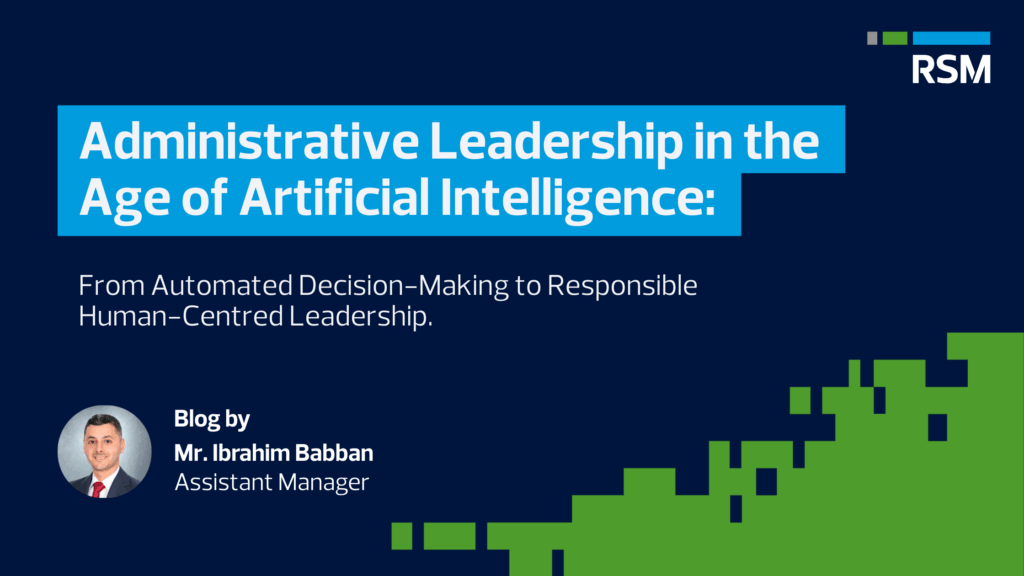
In recent years, technological transformations—foremost among them artificial intelligence (AI)—have imposed a new reality on administrative leadership. According to a report by TechRadar (2025), 62% of executives affirm that AI has become an essential part of strategic decision-making within organizations. This shift reflects the need for leaders to balance the role of technology with preserving the human dimension of leadership, ensuring that decision-making does not become a cold process devoid of ethical and social considerations. Moreover, a study published in the Journal of Business Research (2024) found that organizations leveraging AI in their strategic operations improved their responsiveness to market changes by 18%, underlining the importance of these tools in today’s competitive environment.
The true strength of administrative leadership, however, lies not only in adopting smart tools but in a leader’s ability to use these tools to enhance human communication and inspire teams. An article in the Financial Times (2025) highlights that leaders who successfully combined AI with emotional intelligence managed to navigate economic crises with greater resilience and effectiveness. Here, effective leadership does not rely solely on data, but on framing it within a human context that fosters trust across the organization.
One inspiring example is Satya Nadella, CEO of Microsoft, who managed to integrate AI into the company’s strategy while maintaining focus on human values such as empathy and adaptability. Under his leadership, Microsoft’s market value soared to over $3 trillion by 2024, reflecting the success of balancing technological advancement with human-centred leadership.
In this era, administrative leadership is called upon to be increasingly aware of its ethical responsibilities. Relying on algorithms does not mean abandoning human judgment; rather, it requires reinforcing it. “The mind may chart the path, but the heart gives the journey its meaning” — a proverb that captures the essence of leadership today. A leader who depends solely on data may succeed in achieving efficiency, but will fail to build trust or employee loyalty. A study published in the Harvard Business Review (2024) found that 71% of employees prefer to work under leaders who combine technical competence with human empathy.
Managers must adapt this new managerial approach for several reasons. First, the pace of technological change is accelerating, and leaders who fail to embrace AI risk being left behind in both efficiency and competitiveness. Second, employees and stakeholders increasingly expect leaders to demonstrate not only technical savvy but also emotional intelligence and ethical responsibility, making a balanced approach essential for organizational trust. Third, global markets are becoming more volatile, and leaders equipped with AI-driven insights can respond more quickly to disruptions while still grounding their decisions in human values. Finally, the next generation of talent seeks to work in organizations where leadership reflects both innovation and humanity, positioning adaptive managers as magnets for attracting and retaining high-performing teams.
References
- TechRadar (2025). How AI agents, synthetic data, and executive literacy build resilient organizations.
Retrieved from: https://www.techradar.com/pro/how-ai-agents-synthetic-data-and-executive-literacy-build-resilient-organizations - Journal of Business Research (2024). The impact of AI adoption on organizational responsiveness.
Retrieved from: https://www.sciencedirect.com/journal/journal-of-business-research - Financial Times (2025) Lessons in leadership: facing up to the ‘perfect storm’.
Retrieved from: https://www.ft.com/content/3056919b-a8b6-4f47-a2e0-913f18b63e0e - Axios (2025) AI and leadership.
Retrieved from: https://www.axios.com/2025/05/20/ai-leadership - Harvard Business Review (2024). Leadership in the age of AI.
Retrieved from: https://hbr.org/2024/leadership-in-the-age-of-ai


